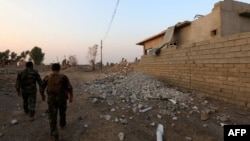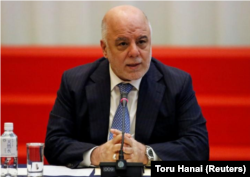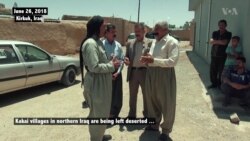The disputed territories between the Iraqi central government and autonomous Kurdistan region in the northeast of the country have recently witnessed a rise in Islamic State attacks, foreshadowing long-term security threats and forcing people from dozens of villages to flee their homes.
The vast disputed lands, consisting of Kirkuk and parts of Nineveh, Saladin and Diyala provinces, have been a point of high contention between the central government and the Kurdistan Regional Government for decades. IS started regrouping in the area after losing control over major cities such as Mosul.
Local residents told VOA that several villages have been deserted in recent weeks due to IS militant attacks and kidnappings, particularly against religious minority groups settled near the Hamrin mountain range and the Kirkuk-Baghdad highway.
During his weekly press conference Tuesday, Iraqi Prime Minister Haider al-Abadi said the desolate terrain of the region, heavily planted with landmines, was to blame for providing a suitable hideout for IS cells.
"This is a long route, walled by mountains and mostly unpopulated," al-Abadi told reporters. "We have military patrols on the roads, but terrorists can also find its way in. They can hide on one of those mountains and wait for a moment of security gap, especially during dark hours, to attack."
Security vacuum
Al-Abadi downplayed concerns that growing instability on the roads could extend to towns and cities, as repeatedly warned by Kurdish officials who claim the withdrawal of their forces from the region has created a security vacuum.
"These are sporadic groups, and we have destroyed their ability to attack and kill civilians inside cities. They have repeatedly tried to attack cities, but our intelligence efforts are always ahead of them," he said.
Al-Abadi's comments came as Iraq's security forces Monday said six of their members were kidnapped by IS militants on the Kirkuk-Baghdad highway.
In a video released Saturday, IS militants said the hostages belonged to the Shiite Popular Mobilization Forces and threatened to kill them in three days if the government did not comply with their request to release Sunni female prisoners.
Following the release of the video, which shocked much of the Iraqi public, al-Abadi held an emergency meeting with security and intelligence leaders and ordered a new special operation to go after the terror cells, Iraq's Security Information Center said in a statement.
The recent abduction of Iraqi security forces is not an isolated case. Local officials told VOA that IS has been involved in dozens of kidnappings across the disputed territories.
Zahid al-Dalawi, a member of the Diyala provincial council, said more than 14 Kurdish families fled their homes in Mardan village east of Khanaqin town near the Iranian border earlier this month after multiple attacks from IS fighters.
Similarly, Salah Hussain, head of Kakai's capital village of Topzawa, told VOA that Kakai villages such as al-Zanqar, Albat Pasha and al-Shashat in southern Kirkuk have been abandoned because of IS threats.
WATCH: IS Attacks Drive Away Iraqi Kakai Minority
Kakai minority
Kakai — also known as the Yarsan — is a syncretic religion spreading across northeastern Iraq and extending to western Iran. Its followers in Iraq, numbering between 110,000 to 200,000, have been persecuted by IS militants who consider the Kakai to be infidels who should convert to Islam.
In 2013, some leaders of the minority group declared their people were actually Muslims, a decision they later said was made to escape IS brutality.
"I only hope that the Iraqi government and other countries come to our rescue to prevent the extinction of our religion," Kakai spiritual leader Koyxa Aziz told VOA.
He said his people have been constantly attacked by Islamist militant groups, including IS predecessor al-Qaida. He said the area remained relatively stable when the Kurdish forces, known as the Peshmerga, were in charge of security.
"Sometimes when I remember the 1960s, when life was so nice here, it makes me cry," grief-stricken Aziz told VOA.
The Kurdish Peshmerga controlled the disputed territories in mid-2014 when the Iraqi forces left their bases following a large-scale push by IS. But they were pushed out by the Iraqi army and allied Popular Mobilization Forces in October 2017, following the Kurdistan Regional Government's independence referendum and the inclusion of those territories in the vote.
VOA's Dilshad Anwar contributed to this report from Kirkuk, Iraq.







